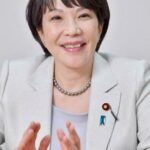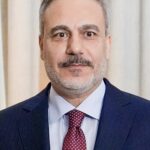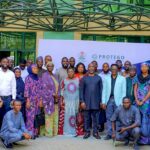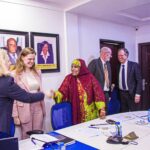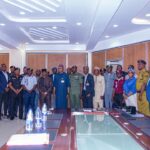Malam Abdullahi Ibrahim is one of the fathers who had vowed never to allow any of his eight children access to immunisation of any sort.
He just didn’t trust the process; that a drop in the mouth, a tablet or injection could prevent polio, measles or tuberculosis was too good to be true.
Ibrahim believed in local herbs, his forefathers had toiled the grounds, fed from it and explored roots, herbs and plants for ailments.
In spite of the viable medicinal stance, he had observed the menace of polio and other vaccine-preventable diseases in his community, the struggle the affected children faced as they grew to adulthood and the toll it left on their families.
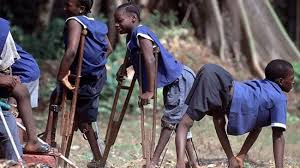
Health officials from the Akko Primary Healthcare Centre, Garko Ward, had told Ibrahim and other fathers, whose consent was needed for immunisation uptake, that routine immunisation from birth could prevent the diseases.
The centre often sensitised the community, educating households on the various vaccinations to be taken.
According to the National Programme on Immunisation, routine immunisation of children in Nigeria is carried out using the following vaccines:
•BCG (Bacilli Calmette Guerin) — at birth or as soon as possible after birth
•OPV (Oral Polio Vaccine) — at birth and at 6, 10, and 14 weeks of age
•DPT (Diphtheria, pertussis, tetanus) — at 6, 10, and 14 weeks of age
•Hepatitis B — at birth, 6 and 14 weeks
•Measles — at 9 months of age
•Yellow Fever — at 9 months of age
•Vitamin A — at 9 months and 15 months of age
The immunisation prevents tuberculosis, whooping cough, polio, measles, hepatitis, among other diseases.
The Federal Ministry of Health and Social Welfare, in collaboration with state ministries of health and primary health centres provide parents or guardians with health cards to track the uptake. Each dose is recorded, the date taken and next due date indicated for easy tracking.
Ibrahim never paid attention to the health workers until a group of fathers, including officials of the Akko Emirate Council, approached him at home, breaking down the information from the health care centre and the benefits vaccines have.

This group, “The Fathers’ Rapid Response Team” had Ibrahim’s friends and leaders, people he interacted with daily and could trust, who dispelled his fears and told him that their children were all vaccinated and had no side effects.
“The team did not relent, they would visit me at home, in my farm, on the way to prayers, telling me of the benefit of immunisation.
“Little by little my doubts were cleared and this April 2025 polio vaccination, for the first time, I gave consent and my children got vaccinated,” Ibrahim said.
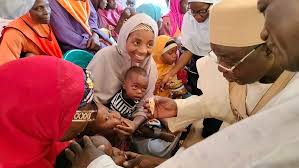
The Fathers’ Rapid Response Team is made up of respected community leaders, members of the emirate council and male influencers, tasked with engaging directly with resistant families to address their concerns.
With continued government advocacy and the buy-in of traditional rulers, groups like the Fathers’ Rapid Response Team are formed by communities to engage fellow community members on government initiatives and benefits to the people.
Malam Mohammed Lawan, the Primary Health Care Coordinator of Akko Local Government, Gombe State, emphasises the critical role the Fathers’ Rapid Response Team has played in rebuilding community trust.
He says the team was established as a strategic response to vaccine hesitancy, recognising the influential role fathers play within families and communities.
“By integrating trusted voices from these critical sectors, the team aims to bridge the gap between healthcare providers and the public, fostering greater understanding and acceptance of vaccines.
“We realised that resistance was rooted in feelings of neglect, especially regarding the lack of access to state government palliatives and long-lasting insecticidal mosquito nets.
“By sending fathers to speak to other fathers, we were able to hear their grievances, correct misinformation, and encourage them to prioritise their children’s health,” he says.
With the intervention of the Fathers’ Rapid Response Team, 55 households in Garko Ward, who before now were resistant to immunisation, have fully complied and vaccinated their children.
Lawan describes the reduction in resistance from 70 to 15 households as a significant achievement but notes that the goal is to reach zero resistance.
“Every child deserves protection,” he adds, reaffirming their commitment to fully immunise all eligible children in Garko Ward.
The Fathers’ Rapid Response Team has remained a significant breakthrough for public health efforts as Alhaji Tasiu Yakubu, a father of two from Unguwan Liman in Garko Ward, also reversed his stance on polio immunisation, allowing his children to receive the vaccine after initially resisting the campaign.
His change of heart was influenced by the Fathers’ Team and his children’s teacher, who also served as the vaccinator.
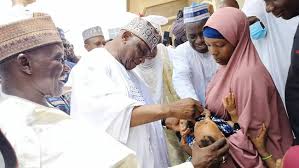
Yakubu had been one of several parents sceptical about the vaccine, questioning the government’s focus on polio while, according to him, other serious diseases, like hepatitis, remained overlooked.
“My argument was, why the emphasis on polio alone? Hepatitis is also deadly and widespread,” he says.
However, after a patient discussion with the Fathers’ Rapid Response Team and his children’s teacher, his perspective shifted. “They took their time to explain everything to me.
“They told me about the dangers of polio, the importance of prevention, and how it affects children for life. I became convinced,” he says.
Moreso, Malam Yunusa Musa and Umaru Mazadu of Jauro Jatau Community, who had long mistrusted government health initiatives, were also convinced after personalised engagements from the team.
They remain vocal, however, about their broader concerns, insisting that the same effort shown in delivering vaccines should be extended to other critical needs like palliatives and infrastructure.
Malam Shuaibu Ahmed, a father of four, commends the government and international organisations like the United Nations Children’s Fund (UNICEF) for providing the polio vaccine free of charge.
He expresses confidence in the vaccine’s safety, highlighting that none of his children had experienced any issues following vaccination.
Ahmed encourages other parents to vaccinate their children, stressing the importance of supporting vaccination campaigns for the well-being and future health of the community.
The Ward Head of Unguwan Liman, Malam Abubakar Mohammed, confirms that proactive community sensitisation has been crucial.
“We don’t wait. Whenever we see a gathering of men or go to the mosque, we talk to people about the importance of child immunisation,” he says.
Malam Umar Ahmed, Secretary of the Akko Emirate Council and a representative of the Fathers’ Response Team, says they leave no stone unturned in their efforts to ensure that people are adequately sensitised, with the aim of making vaccine hesitancy a thing of the past across the entire LGA.
Ahmed lauds their culturally sensitive approach, which he says has significantly improved the vaccination rate in the area.
The Immunisation Officer for Akko LGA, Malam Abubakar Umar, reports that 116,391 children were successfully vaccinated in Garko Ward during the most recent round, out of a target of 129,361.
He credits the success to the collaborative efforts of the Fathers’ Rapid Response Team, Gombe State Primary Health Care Development Agency, the Local Government Authority, and international partners like UNICEF and the World Health Organisation.
In spite of the huge success of the Fathers’ Rapid Response Team in Garko Ward, the remaining 15 households need more convincing to benefit from vaccines.
Some team members note that it is not a smooth sail convincing households to key into the vaccine programme as refusal is deeply rooted in mistrust.
“You need to be very patient and understand that people have the right to their beliefs. You can only state your case and try to persuade them but it’s up to them to make up their minds.
“Following up fathers on a door-to-door campaign is also tasking and time consuming but we do it for the general good.
“You have to engage again and again, sometimes for several months or years as the case may be.
“Some respond quickly, some are adamant and some prefer incentives either in skills, resources, food items or farm inputs to boost their livelihoods,” Malam Aliyu Bello said.
Households and parents have urged the government to include palliatives in the engagement.
They say there will be more vaccine acceptance when the zeal in getting people to take it is extended to other matters affecting the lives of the people directly and indirectly.
They also want similar attention to be extended to other neglected health challenges in the communities and ensure that governance and its attendant benefits trickle down to the grassroots to embolden trust in social activities. (NAN)(www.nannews.ng)

